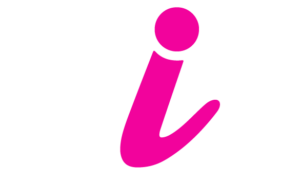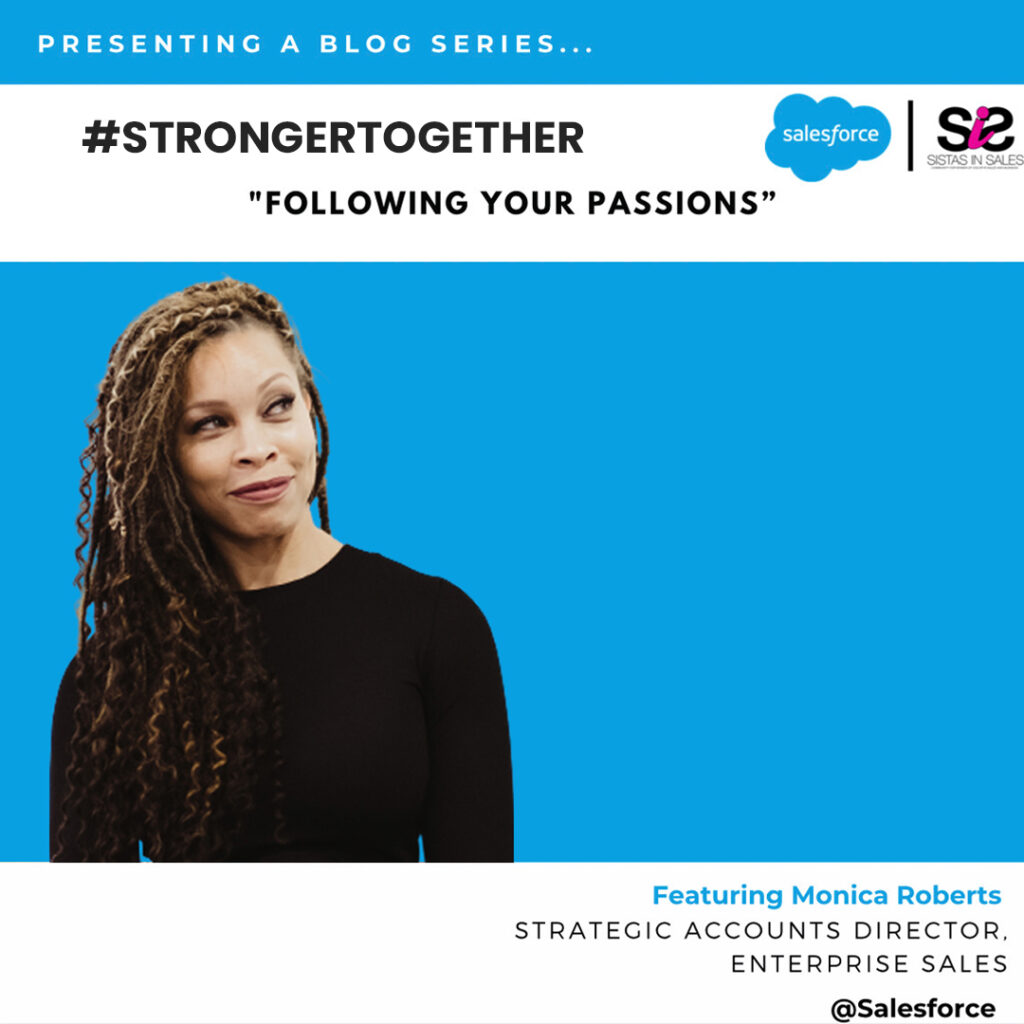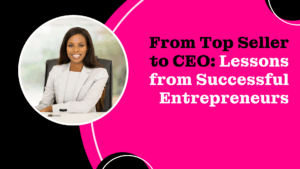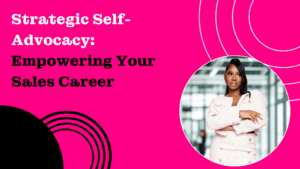Monica Roberts, Strategic Accounts Director – Enterprise Sales at Salesforce
Following her unique combination of talents and inner passions, Monica Roberts started her college journey with pre-med aspirations, ultimately graduating from Baylor with a degree in finance. Continuing a pursuit of medicine because of her love for helping people, she achieved a Master’s in Healthcare Administration. I asked Monica to tell me a little about her sales career, her journey, how she landed at Salesforce, and what advice she would share with others about success in sales.
In your college days, you considered a career in medicine. How did you decide to enter the tech industry and how did you pursue a leadership role once there?
I’ve taken a path less traveled in comparison to my peers; however, it’s a path that has allowed me to follow common threads of passion for people, process, and change.
While pursuing my Master’s degree in Healthcare Administration, I came across an opportunity to be an auditor, which gave me the ability to travel and explore various processes in different departments. This job allowed me to spend time abroad and change scopes of work quickly, but the way I was received as an auditor didn’t really jive with my personality. During this time, I advanced my accounting knowledge through the achievement of an MBA and due to my skill set in process analysis and improvement, I was selected by an IT manager to move into a Business Analyst (BA) role. This is where I was introduced to Salesforce and the value it and its ecosystem bring to the table. Shortly thereafter, I was promoted to IT Service Manager, leading a team of BAs and supporting the entire front office.
After that, I joined one of the top consulting firms in the world and was then recruited by Salesforce as a solution engineer. After 3+ years in the role of SE, I made the transition to Strategic Accounts Director.
Through many transitions, I availed myself to the possibility of change; however, sales was something that I never set out to do. My passions and hope to drive change, guided me here. I am passionate about Salesforce, passionate about the solutions that we can bring to drive value for my customers, and passionate about my customers. I tell my customers all the time how user-friendly Salesforce is: “This is easy configuration, ‘click not code,’ and if I can figure this out, you can too.” One of the reasons I am enthusiastic about Salesforce is because I understand the benefits from the customers’ perspective. That’s one reason I accepted a role in sales for the company—because I know it works!
I like to think that my story could be inspirational to people who are on a certain career path, like finance, and realize, “This is not for me.” I love numbers. I always thought that I was going to be an accountant. I realized the role I was playing in accounting, as an auditor, did not allow me to be seen in the best light by customers as they would hide or shut down when I approached them. It wasn’t a fit with my personality and didn’t really provide the opportunity to be innovative—which my role in sales does.
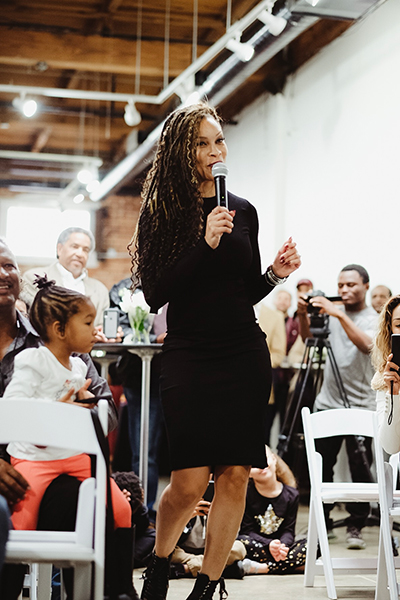
What do you love most about working in sales and what advice would you give to someone considering a career change?
Being customer-facing, being innovative, and working with a team are all aspects of sales that I love. Look at what you’re doing now, and consider how the different aspects of your current or past roles are transferable: process, people, interactions, or improvements. Examine how you can transform that into the career that you want. Too often we get stuck in the lane that we’re in and assume it’s the only way that we can go forward.
You demonstrate two important traits for success in sales: being open to risk and determination. How do these two traits help you succeed?
You certainly must adjust your level of risk aversion in sales because of the compensation model. It’s important to move at a fast pace and pivot on a dime based on customer decisions or changes in the customer’s environment. In my role as a Strategic Accounts Director, I have leadership and coordination responsibilities and also stay on top of customer accounts and am always working to deliver value.
I’m incentivized to make a difference in sales. Having that drive and willingness to get up every morning and say, “Okay, I’m willing to dig a little deeper in order to make something happen,” is essential to my success, my team’s success, and my customers’ success. Listen to your customer. Sometimes you get so caught up in the narrative that you are working, but if you’re not listening to your customer, then there’s a total disconnect. You’re wondering why you lost the deal, but much of that hinges on whether you were truly listening and what you were actually listening for. At the end of the day, were you able to respond to their concerns in the right manner?
What is the best career advice you ever received?
I regularly connect with one of my mentors, Bret Taylor, who is the President and Chief Operating Officer of Salesforce. I recently expressed concerns about being afraid to ask for recognition or compensation. One thing he said was, “Monica, don’t ever apologize for wanting to be compensated for work that you’re doing and for the value you’re bringing to a company.”
I responded, “I don’t want you to think that I’m money hungry. I don’t want you to think that I don’t appreciate where I am.” But in that moment, I recognized that as a Black woman, like many others, I had been indoctrinated into this mindset of just appreciating opportunity. That’s why I am proud to work at a company that is committed to equal pay for equal work, conducting an annual audit to account for any potential discrepancies. Another of my mentors, Leah McGowan-Hare, coached me to “do the work, but don’t feel like you have to be overly gracious and that you can’t ask for what’s fair.” That was really eye-opening to me and helped me pivot my mindset to the value that I could deliver—not only to my team, not only to my organization, but also to my customers.
How has networking, sponsorship, and mentorship influenced your career journey?
Every experience I’ve had along the way has contributed to where I am now. But what has driven the success that I’ve had at Salesforce has been my constant willingness to learn and evolve, to extend myself, and my value to my teammates and customers. With each opportunity, I continue to build a network of people which certainly contributes to success. What’s funny is that the term “networking” used to feel like a forced connection to me, but the intentional, yet natural, relationships that I’ve built at Salesforce have allowed me to foster a collaborative network that includes people like me and allies alike.
One natural (by way of team alignment) turned impactful relationship came by way of a white male colleague. We went from being teammates to friends, mutually engaging in a mentor/mentee relationship. The turn of the relationship caught me off guard at first and I questioned his interest in my success after I was no longer supporting his business endeavors. I remember looking at the company’s organizational chart and thinking, “Why does he care so much about what I’m doing? Why does he care about supporting my career?” I didn’t report to him, but he is the person who actually called me one day and said, “Hey, Monica. At 3:00 a.m., I woke up and thought, I know what Monica needs to do…she needs to be an Accounts Director.” Initially opposed, I chose to hear his perspective out and the success and impact he thought I could have. Fast forward a couple months and conversations with other mentors and sponsors, and here I am–a Strategic Accounts Director!
According to The State of Black Women in Corporate America report published by Lean In and McKinsey & Company in 2020, 59% of Black women said they’ve never had an informal interaction with a senior leader at work and 41% say they have never had a substantive interaction with a senior leader about their work. The same report emphasizes that
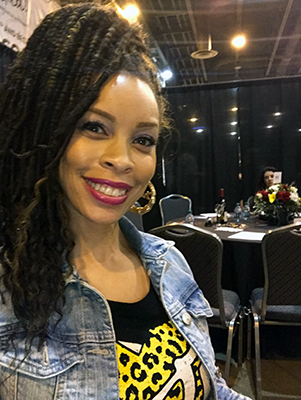
“Mentorship, sponsorship, and professional development opportunities also have a big impact on Black women’s advancement and experiences at work.” To me, sponsorship is about authentic and organic relationships that support, in my case, a woman of color and can help drive our community into places that we might not otherwise have had the opportunity. I believe in God, and I believe that this was ordained for me, and I know that sponsorship has been a powerful variable in my career.
Currently, I work from home and I think, partly because of the pandemic, it’s allowed me to connect with people in a way that I hadn’t been able to before. It’s allowed sponsors to see my value because I’ve extended myself to them and they in turn champion and promote me for other opportunities.
In addition to her successful career, Monica Roberts is a global leader for BOLDforce, Salesforce’s Black employee resource group aimed at empowering the Black community at Salesforce, including programming, team engagement, and representation. Monica is married with three children and is incredibly involved as a leader at her church.
— Cherilynn
Chief Learning Officer, SIS
Cherilynn Castleman, Global Sales Keynote Speaker/Trainer/Executive Coach, has been a sales executive for 20+ years. With her natural talent for teaching and a drive to sell, Cherilynn uses her skills to coach and train other executives and sales professionals. Author of What’s in the C.A.R.D.S.? 5 Post-Pandemic Sales Strategies

Sistas in Sales, LLC (SIS) is a community where women of color in sales can network, advance their careers, and most important, find sisterhood. SIS offers events, a thriving Slack community with companies hiring now, and career coaching services. Learn more about Sistas In Sales membership here, or connect with us on LinkedIn, Instagram, Facebook, and Twitter.

Sponsored by Salesforce.
Learn more about joining Salesforce
